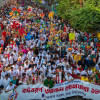Are police willing to arrest culprits?
Police failure to bring the sex offenders of the Pahela Baishakh incident to book gives a worrying message about law enforcers' willingness and capability in dealing with violence against women, said rights activists, student leaders and a teacher.
They alleged that police from the very beginning were not serious about investigating and solving the case wherein at least 20 women were sexually assaulted by an organised gang in the evening of April 14 on the Dhaka University campus for about an hour.
“They [police] have showed great skills in arresting terrorists. But why don't we see the same level of efforts put in to arresting sex offenders, whose photos were obtained from CCTV footages of the incident?” asked women's rights activist Ayesha Khanom, president of Bangladesh Mahila Parishad.
Although a number of police personnel were standing nearby, they did not take any action against the assaulters. Moreover, one officer released two of the culprits caught and handed over to him by the people.
Even when the public demanded investigation with the CCTV footage of the incident released in the media, police, until April 18, kept denying that the women were sexually assaulted.
Eight months later, on December 24, they submitted the final report to Dhaka Chief Metropolitan Magistrate's Court, admitting for the first time that the incident indeed happened, but no arrests could be made.
“Though police identified eight suspected assaulters [from the CCTV footage], they [assaulters] could not be arrested, and also the correct names and addresses of the assaulters could not be obtained,” stated the final report.
It also said the report was submitted for a quick disposal of the case without causing unnecessary delay.
“Why were the two alleged offenders freed? Why was it not investigated?” asked Ayesha. She also claimed that she came to know from very reliable sources that those two men caught by public had connections with the ruling party.
Ayesha opined that the government too was not giving due importance to violence against women issues, and that the police administration's activities only reflect the wishes of the high-ups.
“If our photographs and information are available in our national IDs and saved in some centralised location, why the sex offenders, whose images were obtained, could not be identified?” asked rights activist Khushi Kabir.
“This sends a clear message to the society that if you have connection to power then you can get away even with murder,” she said. She also alleged that the offenders had links with the pro-ruling party student body.
“They [police] don't have the willingness to find them,” said the rights activist.
Liton Nandi, president of Bangladesh Chhatra Union's Dhaka University chapter, who rescued a number of women on that day, said the report reflected the culture of impunity that exists in the country.
“Through this report the state protected the oppressors of women,” he said, adding that the police administration considers such incidents to be common during festivals and thus do not take those seriously.
Pragati Barman, a fourth-year student of Bangla Department at Dhaka University, said the final report proved police's failure to ensure a safe and secured environment for women.
“Police and the DU authorities have failed miserably,” said Tanjim Uddin Khan, associate professor of International Relations at DU. He added that the DU proctorial team was not qualified and equipped enough to deal with new types of crimes taking place on the campus nowadays.

 For all latest news, follow The Daily Star's Google News channel.
For all latest news, follow The Daily Star's Google News channel. 







Comments